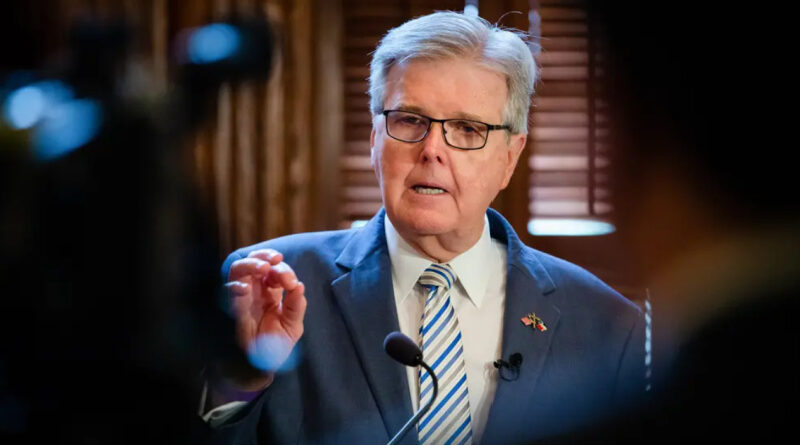Patrick Calls For June Special Session
By Shawn Mulcahy
The Texas Tribune
Lt. Gov. Dan Patrick on Wednesday is asking Gov. Greg Abbott to call a special session of the Texas Legislature in June to advance three pieces of GOP-backed legislation that died in the Texas House at midnight on Tuesday.
The bills sought to ban transgender students from playing on sports teams based on their gender identity, prohibit local governments from using taxpayer funds to pay for lobbyists and punish social media companies for “censoring” Texans based on their political viewpoints.
In a statement, Abbott said the call was premature and instead urged lawmakers to “work together to get important conservative legislation to my desk.”
“Some are trying to end the game before the time clock has run out,” Abbott wrote. “Members in both chambers need to be spending every minute of every day to accomplish that mission.”
In his call to bring back the Legislature, Patrick said the bills in question have widespread support.
(Read:Our continuing coverage of the Texas legislature’s 87th session)
“The TxHouse killed these conservative bills that majority of Texans in both parties support,” Patrick tweeted.
But a national Gallup poll showed that 55% of Democrats — and 10% of Republicans — support letting kids play sports based on their gender identity.
A clear majority of Texans do support the prohibition on taxpayer-funded lobbying, however. An April poll by the University of Texas at Austin and The Texas Tribune found that 69% of Texas voters approved banning local governments from hiring lobbyists to represent them in Austin.
House Democrats pulled out all the stops Tuesday night in a last-ditch effort to block a handful of bills that had the support of Patrick, Abbott and the Texas GOP. The lower chamber faced a midnight deadline to advance Senate bills. Democrats instead spent the day barraging their colleagues with questions, compliments and procedural objections to slow down the process.
A series of objections to key bills forced their sponsors to delay consideration until 11:30 p.m. — leaving just half an hour remaining to take up and vote out the measures. As the midnight deadline drew closer, Democrats offered an amendment to an unrelated bill about prevailing wage rates in a coordinated effort to run out the clock.
When time expired, Democrats cheered and waved transgender pride flags on the House floor, celebrating with a crowd of onlookers in the gallery.
“Democrats had a long, aggressive floor strategy to keep a number of bills, most notably SB 29, from affecting the people of Texas,” state Rep. Julie Johnson, D-Farmers Branch, amd treasurer of the House LGBTQ Caucus, told The Texas Tribune on Tuesday night. “I’m really happy we were able to end the session by preserving the dignity and rights of the children of Texas to be free of discrimination.”
The Texas Constitution grants the governor the power to call a special session of the Legislature “on extraordinary occasions.” During these periods, lawmakers can only consider specific subjects designated in the governor’s proclamation.
Lawmakers are already expected to return to Austin for a special session later this fall to redraw Texas’ political maps, a process known as redistricting that occurs every 10 years following the census.
The Texas Freedom Caucus, a group of hardline House conservatives, echoed Patrick’s call for a special session in a tweet Tuesday. State Rep. Mayes Middleton, R-Wallisville, is the caucus chair and has been a top crusader in the fight against tax-payer-funded lobbying.
“The people of Texas sent a Republican majority to Austin,” the caucus wrote. “They expect results on these issues. We urge the Governor to help ensure results are delivered.”
A substantial piece of leverage Patrick still has is a “safety net” bill for statewide agencies that are soon set to be abolished. Under what’s called a sunset review process, lawmakers periodically make assessments on how efficiently state agencies are being run and whether they should continue to exist. Though agencies are individually considered, there is also a safety net bill each session to extend the life by two years of any agency that did not get individually renewed.
This year, one of those agencies is the Texas Commission on Law Enforcement, which sets minimum licensing and training standards for police. A scathing report from the typically subdued sunset commission called TCOLE toothless, allowing poor accountability and inadequate training for police. Suggested changes — or even extending the regulatory agency’s life by two years while reviewing suggested changes — however, failed in the House.
If the safety net bill does not move out of the Senate by Wednesday, TCOLE will be set to dissolve in September. Patrick and Abbott have both made other policing bills to “back the blue” priorities this year.
The impending elimination of TCOLE could trigger a special session to continue the commission. But it wouldn’t be definite. In 2019, Abbott issued an executive order extending the life of the state plumbing board after a similar move last legislative session. He said he was able to overstep the Legislature because plumbers were still needed to address destruction from Hurricane Harvey. It’s possible the governor could employ similar political maneuvering in this instance.
In 2017, Patrick also pressured Abbott to call a special session over the House’s blockade of a proposal to regulate bathroom use for transgender Texans.
Abbott eventually gave in and called a special session for later that summer, loading up the agenda with not only the so-called “bathroom bill” but also a slew of other conservative priorities. Half of Abbott’s 20-item agenda ended up getting passed, though a “bathroom bill” never made it to Abbott’s desk.
State Rep. Michelle Beckley, D-Carrollton, slammed Patrick’s announcement, noting that a special session was not called to address gun violence after the 2019 El Paso massacre or throughout the coronavirus pandemic that has left 50,000 Texans dead.
Patrick Svitek and Jolie McCullough contributed reporting.
The Texas Tribune is a nonpartisan, nonprofit media organization that informs Texans — and engages with them – about public policy, politics, government, and statewide issues.









